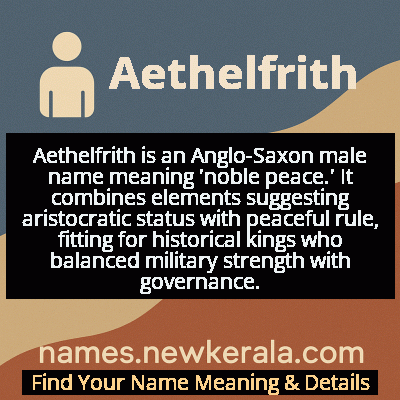Aethelfrith Name Meaning & Details
Origin, Popularity, Numerology Analysis & Name Meaning of Aethelfrith
Discover the origin, meaning, and cultural significance of the name AETHELFRITH. Delve into its historical roots and explore the lasting impact it has had on communities and traditions.
Name
Aethelfrith
Gender
Male
Origin
Anglo
Lucky Number
4
Meaning of the Name - Aethelfrith
Aethelfrith is an Anglo-Saxon male name meaning 'noble peace.' It combines elements suggesting aristocratic status with peaceful rule, fitting for historical kings who balanced military strength with governance.
Aethelfrith - Complete Numerology Analysis
Your Numerology Number
Based on Pythagorean Numerology System
Ruling Planet
Uranus (Rahu)
Positive Nature
Strong sense of order, loyal, practical, and disciplined.
Negative Traits
Stubborn, overly serious, rigid, and prone to feeling restricted.
Lucky Colours
Blue, gray.
Lucky Days
Saturday.
Lucky Stones
Blue sapphire.
Harmony Numbers
1, 7, 8.
Best Suited Professions
Managers, engineers, accountants, organizers.
What People Like About You
Dependability, discipline, practicality.
Famous People Named Aethelfrith
Æthelfrith of Northumbria
Anglo-Saxon King
United Bernicia and Deira to create Northumbria and defeated Welsh kingdoms at major battles
Æthelfrith of East Anglia
Anglo-Saxon King
Maintained East Anglian autonomy during Mercian supremacy and supported religious foundations
Æthelfrith the Ealdorman
Anglo-Saxon Noble
Key military leader under Alfred the Great during Viking wars and defensive campaigns
Name Variations & International Equivalents
Click on blue names to explore their detailed meanings. Gray names with will be available soon.
Cultural & Historical Significance
The name's cultural importance extends beyond its royal associations to represent the complex fusion of Germanic warrior culture with emerging Christian values in early medieval England. As one of the last great pagan Anglo-Saxon kings before the widespread conversion to Christianity, Æthelfrith's legacy bridges the transition from traditional Germanic kingship to Christian monarchy. The name continues to symbolize the foundational period of English history when regional identities were forming and the political landscape of Britain was being permanently reshaped.
Extended Personality Analysis
Individuals named Aethelfrith typically exhibit strong leadership qualities combined with a strategic mindset and natural authority. They tend to be decisive, ambitious, and capable of making difficult choices under pressure, often displaying the same tactical acumen that characterized their historical namesake. There's usually a strong sense of duty and responsibility, coupled with the ability to inspire loyalty and command respect from others.
Beneath the commanding exterior often lies a more complex personality that values tradition and stability while being capable of bold innovation when necessary. These individuals typically possess a strong moral compass and a deep connection to their heritage or cultural roots. They excel in positions of authority but may struggle with compromise, preferring direct action to diplomatic negotiation. The combination of 'noble' and 'peace' in the name's meaning often manifests as someone who seeks to establish order and justice, even if through forceful means.
Modern Usage & Popularity
In contemporary times, Aethelfrith remains an extremely rare given name, primarily used by families with strong interests in Anglo-Saxon history or those seeking distinctive historical names. Its usage is almost exclusively limited to the United Kingdom, particularly in regions with strong Anglo-Saxon heritage like Northumbria and East Anglia. The name sees occasional revival among historical reenactment communities and academic families studying medieval history. While it hasn't appeared in official birth records for centuries, it maintains a niche presence as a middle name or in historical fiction. The complexity and archaic nature of the name prevent widespread modern adoption, but it continues to be appreciated for its historical significance and distinctive character.
Symbolic & Spiritual Meanings
Symbolically, Aethelfrith represents the ideal of noble leadership tempered by peace-making capabilities—a ruler who can both conquer and govern wisely. The name embodies the tension between warrior strength and peaceful administration that characterized successful medieval kingship. It symbolizes foundational power, representing the establishment of dynasties and the creation of lasting political structures. The combination of 'noble' and 'peace' suggests someone who brings order through authority rather than chaos through tyranny.
Metaphorically, Aethelfrith signifies transformation and consolidation—the ability to unite disparate elements into a coherent whole. It represents the bridge between old traditions and new orders, between pagan past and Christian future in English history. The name carries connotations of legacy-building and the establishment of institutions that outlive their founders. It symbolizes the difficult balance between military conquest and stable governance that defines successful state-building throughout history.

